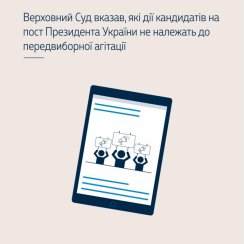Contact center of the Ukrainian Judiciary 044 207-35-46

The Supreme Court represented by a panel of judges of the Administrative Cassation Court made such opinion, having considered a case in appeal procedure under the claim of candidate for the President of Ukraine Anatolii Hrytsenko to candidate for the President of Ukraine Petro Poroshenko.
The plaintiff demanded to recognize the message with 74 illustrative photos published on the Official Internet Resource of the President of Ukraine Petro Poroshenko (the Presidential Administration of Ukraine) under the results of his service trip to Odesa oblast, as election canvassing; to oblige the defendant to pay for this election canvassing from his personal electoral fund, as well as to oblige him to refrain from holding election canvassing financed with budgetary funds.
Having heard the explanations of representatives of the case participants, having studied the gathered evidence in the case, the Administrative Cassation Court within the Supreme Court stated the lack of reasons to satisfy the claim.
The panel of judges found that the message with illustrative photos was not aimed at motivation of electors to vote for or not to vote for a certain candidate, did not include statements and did not give reasons for appearing value judgments on advantages or disadvantages of a certain candidate, did not give preference to a certain candidate in any form.
The panel of judges also emphasized that despite similar orientation with classical (TV, radio, etc.) mass-media and the efficiency of information presentation for the target audience, the lack of normative regulation of activity in the Internet made it impossible to identify any web-site, particularly, information or official web-page of a public authority, with the mass-media (except for a situation, when web-site is registered within a legally established procedure as the mass-media).
The Court concluded that the Official Internet Resource of the President of Ukraine was not the mass-media. It performs the role of source of official information provided for the mass-media, but not an independent mass-media (Provision on the Presidential Administration of Ukraine approved by the Decree of the President of Ukraine No. 504/2010 of 2 April 2010).
The Supreme Court refuted the argument of the plaintiff as for the fact that the publication of the noted information represented canvassing financed with budgetary funds maintained by the Presidential Administration of Ukraine, but not in the legally established manner. The Court found that, since the information publication was not electoral canvassing but highlighting the activity of the President of Ukraine, such highlighting should not be covered with prohibitions established by Article 37 of the Law of Ukraine “On the Elections of the President of Ukraine”.
Judgment of the Supreme Court of 10 March 2019 in the case No. 855/64/19 (proceedings No. А/9901/52/19 )– http://www.reyestr.court.gov.ua/Review/80332810 .